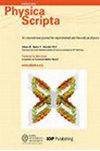Entanglement enhancement of two giant atoms with multiple connection points in bidirectional-chiral quantum waveguide-QED system
IF 2.6
3区 物理与天体物理
Q2 PHYSICS, MULTIDISCIPLINARY
引用次数: 0
Abstract
We study the entanglement generation of two giant atoms within a one-dimensional bidirectional-chiral waveguide quantum electrodynamics (QED) system, where the initial state of the two giant atoms are ∣ea, gb〉. Here, each giant atom is coupled to the waveguide through three connection points, with the configurations divided into five types based on the arrangement of coupling points between the giant atoms and the waveguide: separate, fully braided, partially braided, fully nested, and partially nested. We explore the entanglement generation process within each configuration in both nonchiral and chiral coupling cases. It is demonstrated that entanglement can be controlled as needed by either adjusting the phase shift or selecting different configurations. For nonchiral coupling, the entanglement of each configuration exhibits steady state properties attributable to the presence of dark state. In addition, we find that steady-state entanglement can be obtained at more phase shifts in certain configurations by increasing the number of coupling points between the giant atoms and the bidirectional waveguide. In the case of chiral coupling, the entanglement is maximally enhanced compared to the one of nonchiral case. Especially in fully braided configuration, the concurrence reaches its peak value 1, which is robust to chirality. We further show the influence of atomic initial states on the evolution of interatomic entanglement. Our scheme can be used for entanglement generation in chiral quantum networks of giant-atom waveguide-QED systems, with potential applications in quantum networks and quantum communications.双向手性量子波导-QED 系统中具有多个连接点的两个巨原子的纠缠增强
我们研究了两个巨原子在一维双向手性波导量子电动力学(QED)系统中纠缠的产生,其中两个巨原子的初始状态分别为∣ea, gb〉。在这里,每个巨原子通过三个连接点与波导耦合,根据巨原子与波导之间耦合点的排列,配置分为五种类型:分离型、完全编织型、部分编织型、完全嵌套型和部分嵌套型。我们探讨了非手性和手性耦合情况下每种构型中纠缠的产生过程。结果表明,纠缠可以根据需要通过调整相移或选择不同的配置来控制。对于非手性耦合,每个构型的纠缠都表现出稳态特性,这归因于暗态的存在。此外,我们还发现,通过增加巨原子与双向波导之间的耦合点数量,可以在某些构型中以更多的相移获得稳态纠缠。与非手性情况相比,手性耦合情况下的纠缠得到了最大程度的增强。特别是在全编织结构中,并合达到了峰值 1,这对手性是稳健的。我们进一步展示了原子初始状态对原子间纠缠演化的影响。我们的方案可用于巨原子波导-QED 系统手性量子网络中的纠缠生成,在量子网络和量子通信中具有潜在的应用前景。
本文章由计算机程序翻译,如有差异,请以英文原文为准。
求助全文
约1分钟内获得全文
求助全文
来源期刊

Physica Scripta
物理-物理:综合
CiteScore
3.70
自引率
3.40%
发文量
782
审稿时长
4.5 months
期刊介绍:
Physica Scripta is an international journal for original research in any branch of experimental and theoretical physics. Articles will be considered in any of the following topics, and interdisciplinary topics involving physics are also welcomed:
-Atomic, molecular and optical physics-
Plasma physics-
Condensed matter physics-
Mathematical physics-
Astrophysics-
High energy physics-
Nuclear physics-
Nonlinear physics.
The journal aims to increase the visibility and accessibility of research to the wider physical sciences community. Articles on topics of broad interest are encouraged and submissions in more specialist fields should endeavour to include reference to the wider context of their research in the introduction.
 求助内容:
求助内容: 应助结果提醒方式:
应助结果提醒方式:


